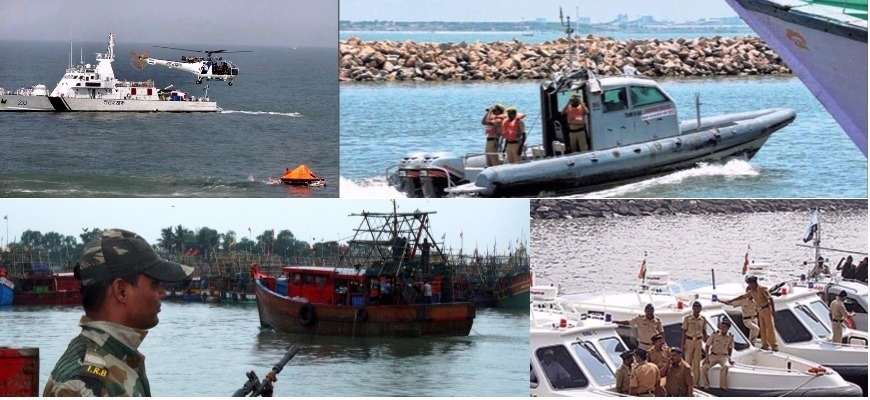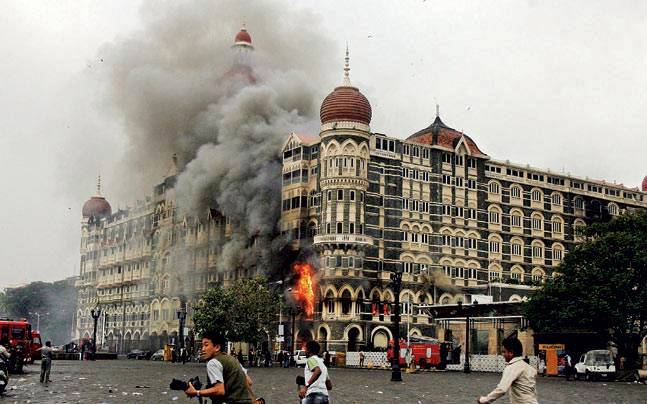Nine Years after 26/11: Actionable Intelligence is the Key To Effective Coastal Security
About two to six months before the 26/11 Mumbai attacks, RAW had intercepted several telephone calls through Signal Intelligence(SIGINT), which pointed at impending attacks on Mumbai hotels by Pakistan terrorists, however, there was a coordination failure and no follow up action was taken. Few hours before the attacks, a RAW technician monitoring satellite transmissions picked up conversations between attackers and handlers, as the attackers were sailing towards Mumbai. The technician flagged the conversations as being suspicious and passed them on to his superiors. RAW believed that they were worrying and immediately alerted the office of the National Security Advisor. However, the intelligence was ignored.

Intelligence Failures
To be fore-warned is to be fore-armed—is a universally accepted truism. But, regrettably and statistically speaking, intelligence agencies the world over do appear to be under far more stress than hitherto fore, reactive than being proactive as recurring terrorist acts and major security failures have unmistakably shown Whether it is 26/11, Kargil, or Sri Lanka(Op Pawan), intelligence has been the country’s weakest link. The Bangladeshi migration from the sea continues in West Bengal, Odisha, Andhra Pradesh. Smuggling is a way of life in the Sunderban delta. Smuggling of gold, narcotics, and other items continues on the western coast but we are unable to get actionable intelligence to stop it.
The lack of adequate intelligence in effectively combating illicit trade, gun-running and smuggling had been brought out by Mr. MK Dhar, Deputy Director of the IB.
The aim of this article is to carry out an appraisal of the existing intelligence structure to focus on the drawbacks and shortcomings and suggest a suitable intelligence apparatus that is integrated to meet all challenges.
India, situated easily in one of the most violent expanses of the world and with two of its major neighbours- China and Pakistan, congenitally anti -India, make India’s intelligence agencies tasks, more than formidable and exacting.
The first name that strikes in every Indian mind while talking of maritime terrorism is that of Dawood Ibrahim, who remains sheltered in Pakistan despite having proven links with the transnational syndicates of almost all the activities connected with the maritime terrorism. Successful routes established over the years by Ibrahim's syndicate have been subsequently utilized by Bin Laden.
Pakistan wanted to replicate the Afghan model in Kashmir, hoping to make it a theatre of Jihad for all the Muslims. They failed. Over the years, the Jihadi irregulars have become an integral part of Pakistan’s war-machine. Pakistani researchers have enumerated 11,500 Pakistanis having been killed in India in terrorist operations; though our own estimates are substantially higher. The fact that despite this massive degradation, Pakistan is able to sustain a steady flow of Jihadis to bleed India, calls for revisiting our responses. The growth of powerful Jihadi Wahhabism, perceiving India as its target, is a serious security and ideological threat.

Breaking Intelligence Encirclement of India
Collaborative networking with the underworld, gun runners, drug syndicates, currency counterfeiters, hawala operators, border couriers, etc. is being used to enhance their covert capability to destabilize India. Intelligence encirclement of India will have to be broken by covert offensive means.
Covert action has emerged as an important instrument of State Policy. It is a low-cost sustainable offensive, employed by Pakistan. We need to carry out such operations on the Gujrat, West Bengal borders( especially Sunderbans) and Kerala coasts and nab Pak operatives.
National Intelligence Grid (NATGRID) is the Way Ahead
No intelligence agency can be right every time. A finely balanced co-operative system is vital if intelligence and operational units are sensibly interacting. What are the maritime threat and enemy modus operandi? Are the Indian intelligence agencies effective? What are the weaknesses in intelligence and what Impact it has on Coastal security?
NATGRID is part of the radical overhaul of the security and intelligence apparatuses of India that was mooted. The NATGRID is essentially a tool that enables security agencies to locate and obtain relevant information on terror suspects from pooled data of various organizations and services in the country.
The NATGRID with a strong coastal component is the way ahead.
What Should be Done
Police, Naval and ICG leadership should be able to give clear directives to intelligence organization and must monitor it.
There should be a coastal security policy emerging at the highest level, which is updated every time and intelligence policy must be based on this security policy.
An integrated apex body to control all intelligence organizations must exist. It should have powers for both administrative and executive control.
The latest technological and scientific know-how must be incorporated in the intelligence organizations.
Intelligence-led Smart Operations
They are like heat-seeking missiles – chasing their target till the threat is destroyed. In addition, precise and real-time intelligence is a high potency force multiplier, a handful of highly dedicated and skilled professionals can achieve more success than much larger force level.
The failure to collect HUMINT in the intelligence gathering process must be urgently addressed. While the RAW, IB, Indian Army is foremost practitioners of HUMINT, the skills must be passed on to IN and ICG.
Intelligence Failures must be studied regularly so as not to commit the same mistakes again.
We need intelligence about smugglers, criminals involved in smuggling of arms, ammunition, narcotics, fake currency, illegal migrants etc.
We need to create intelligence folders for all coastal districts containing intelligence about suspects, vulnerable areas on the coastline. intelligence about sea wing of various terror organizations must be updated. Gaps, if any, must be removed.
When and where will the next terror attack take place on the coast is a question that needs to be answered.
Sabotage should not been ruled out, in most accidents of naval vessels Sabotage, subversion must be guarded against.
With the drug menace only increasing in the metro cities on the coast, the NCB has to get its act together.
NTRO has tremendous potential and it should be tasked to focus on Gulf countries, Pakistan, Bangladesh and Sri Lanka coastlines for asymmetric challenges.
The economic intelligence wing of all above organizations should be tasked to focus on front organizations of anti-national elements and their known supporters. Intelligence encirclement of India by inimical forces must be broken.
Demographic invasion from Bangladesh is a serious security threat. They have flooded the coastal areas. We will have to detect and deport them.
We need an organization which will carry out offensive cyber operations against the hackers from inimical countries.
IN, ICG and police should conduct intelligence-based smart operations.
Coastal security agencies must make full use of the intelligence database created by NATGRID. It will help identify, capture and prosecute terrorists and help pre-empt asymmetric challenges.
Creation of ‘National Academy of Coastal intelligence’ will boost quality of intelligence
Private sector participation in intelligence collection, especially for own security and counterintelligence is required.
We require dedicated cyber warfare cell for maritime, coastal security.
Use of geospatial technologies for maritime security will be of immense help.
Informers, fishing cooperatives for data collection is important.
Cooperation for intelligence sharing, media and information warfare at international level will help us to work out database of suspects with the help of friendly countries.
There are a plethora of intelligence agencies but what is more important is proper tasking of all available agencies for stopping all dangers to the coastline. The operational commanders of IN, ICG and Police should understand their capabilities and limitations of each of them and task them accordingly.
Police, Naval and ICG leadership should be able to give clear directives to intelligence organization and must monitor it. The success or failure of an intelligence system will depend upon the directions given to it by senior officers of IN, ICG, CISF and police. Intelligence collection is a formidable challenge which must be met head-on.
Conclusion
Repeated intelligence failures have cost the nation dearly. Security forces leadership should understand that intelligence is a serious business and it ought to be given the due importance it deserves. Good intelligence is an important element and tool to achieve operational success. Therefore, we need to seriously take stock of the existing shortcomings and make changes in the intelligence apparatus to meet the needs of coastal security.
The war on terrorism, smuggling, illegal trade, crime at sea and piracy has to be fought at all levels. It should be characterized not only by deterrence but also proactively countering it on international levels by employing all means, namely, political, diplomatic, military, economic and social. The campaign should balance short-term efforts to destroy terrorists, smugglers, pirates with longer-term efforts to diminish the public appeal and power of terrorism and to address underlying problems.
The success of coastal security measures would be a direct function of jointmanship between the India Navy(IN), Indian Coast Guard ,Coastal Police, CISF, Water wing BSF, coastal states & many more establishments located on the coast. It can only be hoped that the biggest gap in India’s security – the inefficiency of administration – will be overcome and that a measure of urgency will attend the implementation of current plans for a stronger coastal security system.
Brig Hemant Mahajan, YSM, Def Analyst. He has recently written a Monogram on “India’s Coastal Security, Challenges, Concerns & Way Ahead” available at https://www.amazon.in/Indias-Coastal-Security-Challenges-Concerns/dp/8193406028
